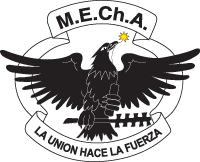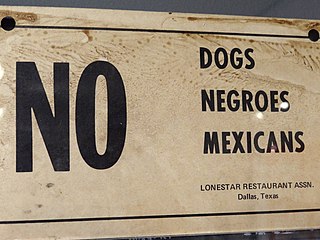Related Research Articles

M.E.Ch.A. is a US-based organization that seeks to promote Chicano unity and empowerment through political action. The acronym of the organization's name is the Chicano word mecha, which is the Chicano pronunciation of the English word match and therefore symbolic of a fire or spark; mecha in Spanish means fuse or wick. The motto of MEChA is 'La Union Hace La Fuerza'.
The Stanford University School of Humanities and Sciences is the heart of the undergraduate program and grants the majority of Stanford University's degrees. The School has 23 departments and 20 interdisciplinary degree-granting programs. The School was officially created in 1948, from the merger of the Schools of Biological Sciences, Humanities, Physical Sciences, and Social Sciences. Those schools date from the mid-1920s when the university first organized individual departments into schools.

Oakes College is a residential college at the University of California, Santa Cruz. It is on the southwestern corner of the campus, south of Rachel Carson College and east of the Family Student Housing complex.

Rainbow/PUSH is a Chicago-based nonprofit organization formed as a merger of two nonprofit organizations founded by Jesse Jackson; Operation PUSH and the National Rainbow Coalition. The organizations pursue social justice, civil rights, and political activism.
Ethnic studies, in the United States, is the interdisciplinary study of difference—chiefly race, ethnicity, and nation, but also sexuality, gender, and other such markings—and power, as expressed by the state, by civil society, and by individuals. "The unhyphenated-American phenomenon tends to have colonial characteristics," notes Jeffrey Herlihy-Mera in After American Studies: Rethinking the Legacies of Transnational Exceptionalism: "English-language texts and their authors are promoted as representative; a piece of cultural material may be understood as unhyphenated—and thus archetypal—only when authors meet certain demographic criteria; any deviation from these demographic or cultural prescriptions are subordinated to hyphenated status." As opposed to International studies, which was originally created to focus on the relations between the United States and Third World Countries, Ethnic studies was created to challenge the already existing curriculum and focus on the history of people of different minority ethnicity in the United States. Ethnic studies is an academic field that spans the humanities and the social sciences; it emerged as an academic field in the second half of the 20th century partly in response to charges that traditional social science and humanities disciplines such as anthropology, history, literature, sociology, political science, cultural studies, and area studies were conceived from an inherently Eurocentric perspective. Its origin comes before the civil rights era, as early as the 1900s. During this time, educator and historian W. E. B. Du Bois expressed the need for teaching black history. However, Ethnic Studies became widely known as a secondary issue that arose after the civil rights era. Ethnic studies was originally conceived to re-frame the way that specific disciplines had told the stories, histories, struggles and triumphs of people of color on what was seen to be their own terms. In recent years, it has broadened its focus to include questions of representation, racialization, racial formation theory, and more determinedly interdisciplinary topics and approaches.

Thurgood Marshall College (Marshall) is one of the seven undergraduate colleges at the University of California, San Diego. The college, named after Thurgood Marshall, the first African-American Supreme Court Justice and lawyer for the landmark 1954 Supreme Court case Brown v. Board of Education, emphasizes "scholarship, social responsibility and the belief that a liberal arts education must include an understanding of [one's] role in society." Marshall College's general education requirements emphasize the culture of community involvement and multiculturalism; accordingly Marshall houses the minors in Public Service and Film Studies for the campus. Significant academic programs and departments have come out of the college over many decades: Communication, Ethnic Studies, Third World Studies, African American Studies, Urban Studies & Planning, and Education Studies.
Latino studies is an academic discipline which studies the experience of people of Latin American ancestry in the United States. Closely related to other ethnic studies disciplines such as African-American studies, Asian American studies, and Native American studies, Latino studies critically examines the history, culture, politics, issues, sociology, spirituality (Indigenous) and experiences of Latino people. Drawing from numerous disciplines such as sociology, history, literature, political science, religious studies and gender studies, Latino studies scholars consider a variety of perspectives and employ diverse analytical tools in their work.
The Stanford Review is a student-run newspaper that serves Stanford University in Stanford, California. It was founded in 1987 by Peter Thiel and Norman Book.

The East Los Angeles Walkouts or Chicano Blowouts were a series of 1968 protests by Chicano students against unequal conditions in Los Angeles Unified School District high schools. The first walkout occurred on March 5, 1968. The students who organized and carried out the protests were primarily concerned with the quality of their education. This movement, which involved thousands of students in the Los Angeles area, was identified as "the first major mass protest against racism undertaken by Mexican-Americans in the history of the United States."
The League of Revolutionary Struggle (Marxist–Leninist) was a Marxist–Leninist[1] movement in the United States formed in 1978 by merging communist organizations. It was dissolved by the organization's leadership in 1990.
Chicana/o studies, also known as Chican@ studies, originates from the Chicano Movement of the late 1960s and 1970s, and is the study of the Chicana/o and Latina/o experience. Chican@ studies draws upon a variety of fields, including history, sociology, the arts, and Chican@ literature. The area of studies additionally emphasizes the importance of Chican@ educational materials taught by Chican@ educators for Chican@ students.

Black-brown unity, variations include black-brown-unity[4][5] and black-brown-red unity,[6] is a racial-political ideology which initially developed among black scholars, writers, and activists who pushed for global activist associations between black people and brown people ,and Indigenous peoples of the Americas to unify against white supremacy, colonialism, capitalism, and, in some cases, European conceptualizations of masculinity, which were recognized as interrelated in maintaining white racial privilege and power over people of color globally.[7][8]
The Black Action Movement was a series of protests by African American students against the policies and actions of the University of Michigan. The protests themselves took place on three occasions in 1970, 1975, and 1987. Many student organizations participated in the movement, which has been called one of the most challenging for administrators in the school's history. Alan Glenn of the Ann Arbor Chronicle said of the 1970 protests that "the BAM strike became one of the few protests of that era in which the students could make a valid claim of victory."
Roderick Ferguson is Professor of Women's, Gender, and Sexuality Studies and American Studies at Yale University. He was previously professor of African American and Gender and Women's Studies in the African American Studies Department at the University of Illinois, Chicago. His scholarship includes work on African-American literature, queer theory and queer studies, classical and contemporary social theory, African-American intellectual history, sociology of race and ethnic relations, and black cultural theory. Among his contributions to queer theory, Ferguson is credited with coining the term Queer of Color Critique, which he defines as "...interrogat[ion] of social formations as the intersections of race, gender, sexuality, and class, with particular interest in how those formations correspond with and diverge from nationalist ideals and practices. Queer of color analysis is a heterogeneous enterprise made up of women of color feminism, materialist analysis, poststructuralist theory, and queer critique." Ferguson is also known for his critique of the modern university and the corporatization of higher education.
Cecilia Preciado de Burciaga was a Chicana scholar, activist and educator. Burciaga worked for over twenty years at Stanford University where she was the "highest ranking Latino administrator on campus." She advocated for the University to hire more women and people of color when she was a high-ranking administrator at Stanford. She was also extremely committed to enrolling more Chicano students, especially in graduate studies. Burciaga served on the National Advisory on Women with President Jimmy Carter and for President Bill Clinton as a member of the White House Initiative on Educational Excellence for Hispanic Americans. An award named after her and her husband, José Antonio Burciaga, is given at Stanford to students who show significant contributions to the community.

The Brown Center for Students of Color (BCSC), formerly known as the Third World Center, is a center for the support of students of color at Brown University. Founded in 1972 at Brown University in Providence, Rhode Island, the Center is "a place and space for students of color to explore their identity, develop their leadership skills, and build a sense of community in a welcoming and supportive environment." The BCSC was founded out of a rich history of student activism and organizing, a history that is honored in its mission today.
The Third World Liberation Front (TWLF) rose in 1968 as a coalition of ethnic student groups on college campuses in California in response to the Eurocentric education and lack of diversity at San Francisco State College and University of California, Berkeley. The TWLF was instrumental in creating and establishing Ethnic Studies and other identity studies as majors in their respective schools and universities across the United States.
In 1968, the Third World Liberation Front (TWLF), a coalition of the Black Students Union, the Latin American Students Organization, the Filipino American Collegiate Endeavor (PACE) the Filipino-American Students Organization, the Asian American Political Alliance, and El Renacimiento, a Mexican-American student organization, formed at San Francisco State University (SFSU) to call for campus reform. Another Third World Liberation Front was formed at University of California, Berkeley in January 1969. These coalitions initiated and sustained the Third World Liberation Front strikes of 1968, one of the longest student strikes in US history.
The University of California, Los Angeles Asian American Studies Center (AASC) is an organization that educates students and the general public about the history of Asian American and Pacific Islanders and their experiences. The AASC is one of the leading and groundbreaking organizations to have substantial and credible resources for their research. Located in Campbell Hall, the AASC quickly became a center for resource-gathering and scholarship for the Asian American movement. Asian American student organizations at CSULA, Occidental, USC, and other colleges soon followed. It was a vital hub and training ground for young activists, a place where they could earn a salary while doing community work.
Amy Laura Wax is an American lawyer, neurologist, and academic. She is the Robert Mundheim Professor of Law at the University of Pennsylvania Law School. Her work addresses issues in social welfare law and policy, as well as the relationship of the family, the workplace, and labor markets. She has often made remarks, about non-white people, described as white supremacist and racist.
References
- ↑ Stanford University Archives: University Committee on Minority Issues, Records SC0363
- ↑ New York Times: In Dispute on Bias, Stanford Is Likely To Alter Western Culture Program
- ↑ Illiberal Education: The Politics of Race and Sex on Campus
- ↑ The Stanford Reorientation Guide 2009-2010
- ↑ Students of Color Coalition: A History of Social Progress and Achievement
- ↑ The Asian American Movement
- ↑ To Build Coalition: The Cause of SOCC
- ↑ The Stanford Daily: Guaranteed Success For SOCC
- ↑ The Stanford Daily. The IHUM epic: transformation of the humanities at Stanford